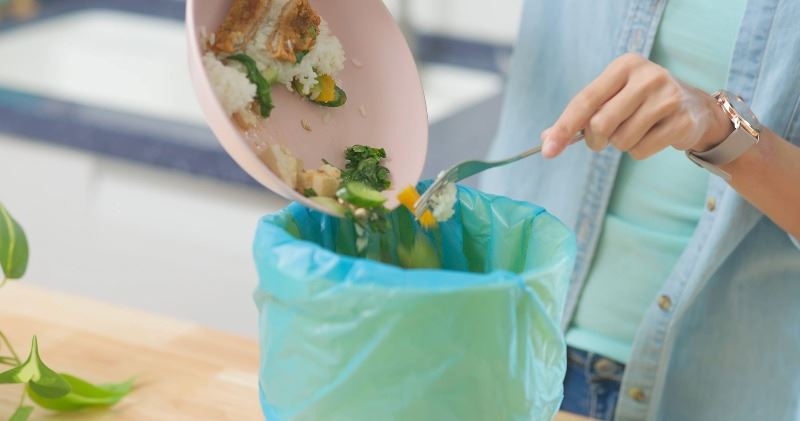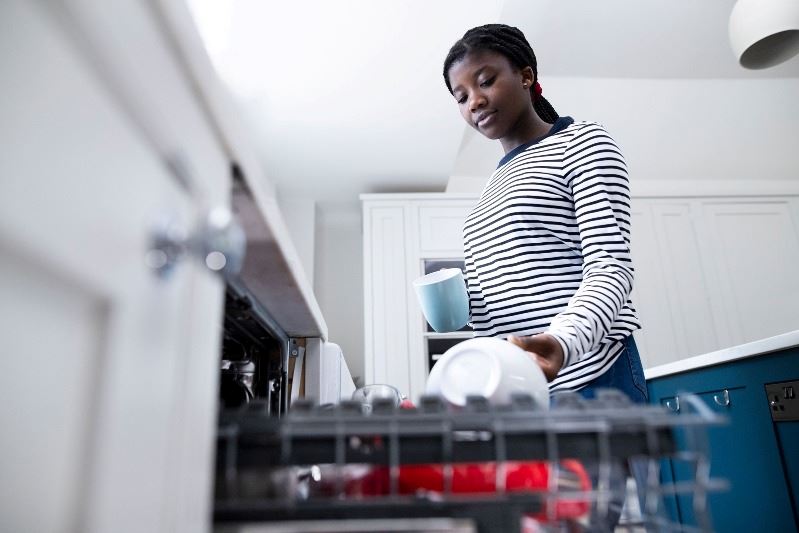There are many ways to try to reduce your environmental impact in the kitchen. The goal is to aim for better than before, not perfection. Even imperfect efforts make a difference!
 Compost food scraps
Compost food scraps
My biggest recommendation to anyone looking to get started is to begin separating your compostable waste and taking it to our compost drop site in Roseville. Up to about 20% of household waste is made up of food scraps and 30-40% of our entire food supply is wasted each year in the United States.
By composting, we turn food waste into something useful that helps improve soil and water quality, rather than sending it to a landfill or incinerator.
Ramsey and Washington County are rolling out their food scraps pickup program (Roseville should start getting it in 2024 or 2025), which will make separating food scraps easier for residents.
Add a few vegetarian entrees to your weekly meal-planning
Meat, and especially beef, is extremely resource-intensive to produce. Giving up beef once a week for beans over the course of a year saves the equivalent emission of burning 38 gallons of gasoline.
Eat produce in season and locally grown
Produce is less expensive and more delicious (and nutritious) when in season, and when you purchase food produced locally, there are fewer emissions from food travel. Plus, supporting local growers keeps money flowing within our local economy. Check Minnesota Grown for producers located in and around the Twin Cities!
Learn how to store produce and other food, and understand what “best by,” “sell by,” and other dates on perishable items mean. Learning how to store food properly and how long it is safe to eat will help cut down on food waste in the kitchen. When in doubt, use your senses – sight, touch, smell – to judge if something has gone bad.
Limit or stop the use of gas stoves
Burning natural gas releases nitrogen dioxide, which can cause or worsen respiratory illness, including asthma in children. Consider a countertop induction element, or take advantage of upcoming IRA rebates to replace your gas stove with an electric or induction model.
Avoid “single purpose” cooking accessories
Food Network Host Alton Brown calls them “unitaskers.” These are the trendy gadgets, that despite our best intentions, add clutter and encourages overconsumption.
 Use a smaller appliance to heat smaller dishes - use a toaster oven, microwave, or air fryer when heating or reheating small dishes rather than heating up your entire oven.
Use a smaller appliance to heat smaller dishes - use a toaster oven, microwave, or air fryer when heating or reheating small dishes rather than heating up your entire oven.
Use your dishwasher if you have one, and run full loads
Modern dishwashers are designed to use water very efficiently compared to handwashing, so load it up! Make sure you run a full dishwasher to make the most of the water being used.
Scrape dishes but don’t rinse them before loading into the dishwasher. Again, modern dishwashers are built to remove stuck-on food, so scrape what you can into the compost and avoid temptation to rinse. It saves water needed to run a garbage disposal too!
Upgrade your faucet nozzle to a high-efficiency flow model
A simple screw-on aerator can be found for just a few dollars, or if you’re updating your whole faucet, look for the WaterSense logo when shopping around.
Learn more about Roseville sustainability here.
Article written by Noelle Bakken, Sustainability Specialist